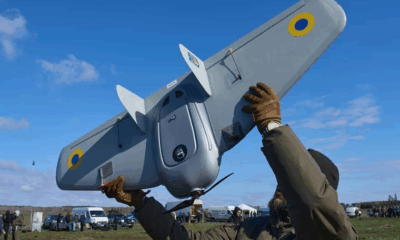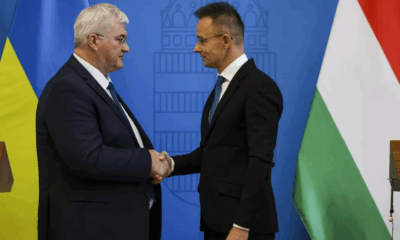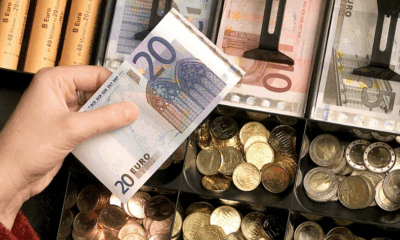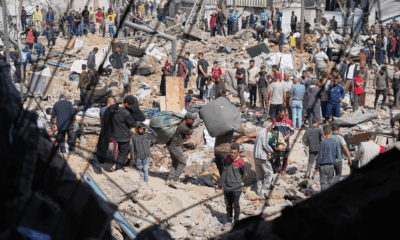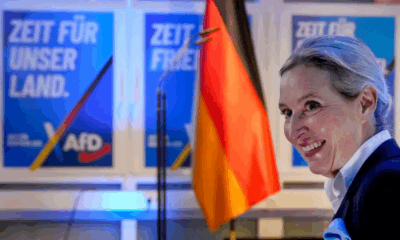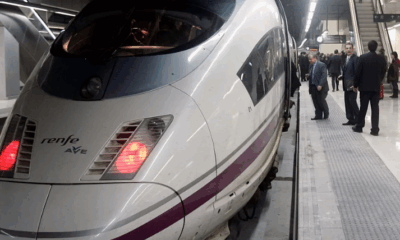News
UK Prime Minister Keir Starmer Signals Willingness to Send Peacekeeping Troops to Ukraine
British Prime Minister Keir Starmer has for the first time publicly stated that he would be willing to send UK troops to Ukraine as part of a European peacekeeping force, should a deal be reached with Moscow requiring such an arrangement.
His remarks, made in an op-ed for The Daily Telegraph on Sunday, come just ahead of an emergency meeting of European leaders in Paris, where discussions are expected to focus on the shifting geopolitical landscape following recent statements by the Trump administration regarding US involvement in Ukraine.
UK’s Commitment to Ukraine’s Security
In his op-ed, Starmer acknowledged the risks of deploying British troops, saying it would mean “putting them in harm’s way.” However, he described the situation as an “existential” issue for Europe and a “once in a generation moment” that required decisive action.
He reiterated the UK’s long-term commitment to Ukraine, pledging to maintain £3 billion (€3.6bn) in annual military aid until 2030 and positioning Britain as a key leader in European defence and security efforts.
European Response to US Policy Shift
Starmer’s comments come in the wake of a series of statements by senior officials in the new Trump administration, which have raised concerns among European allies about Washington’s long-term commitment to Ukraine.
Last week, US President Donald Trump and Secretary of Defence Pete Hegseth suggested that America would scale back its defence commitments in Europe, while US Special Envoy on Ukraine and Russia Keith Kellogg stated that Europe would likely be excluded from upcoming peace talks between Russia and Ukraine.
These remarks have left European leaders scrambling to determine their role in shaping a potential peace deal, as the US and Russian delegations prepare for talks in Saudi Arabia this week.
Growing Support for European Peacekeeping Force
The idea of a European-led peacekeeping mission in Ukraine is not new. It was first suggested by French President Emmanuel Macron in early 2024, when he refused to rule out deploying French troops. Since then, the concept has gained traction, though details remain scarce on what such a force would look like, which nations would participate, and under what conditions troops would be deployed.
The composition and role of the force would largely depend on the terms of a potential peace agreement, the status of the frontline, and the presence of Ukrainian and Russian troops on the ground.
Calls for Increased Defence Spending in Europe
In his op-ed, Starmer echoed growing calls from US and EU officials urging European nations to increase defence spending and take on a greater role within NATO.
Currently, eight of NATO’s 30 European members have yet to meet the alliance’s target of spending 2% of GDP on defence. The UK currently allocates 2.3% of its GDP to defence, with plans to increase this to 2.5%, though Starmer’s Labour government has not yet provided a clear timeline for achieving this goal.
Paris Summit and European Unity
Monday’s emergency meeting in Paris will see Starmer join leaders from Germany, Italy, Poland, Spain, the Netherlands, and Denmark, along with European Commission President Ursula von der Leyen and NATO Secretary-General Mark Rutte.
The summit is expected to focus on coordinating Europe’s response to the evolving US stance, the potential formation of a European-led peacekeeping force, and broader discussions on strengthening European defence capabilities in light of shifting global alliances.
News
EU Seeks Closer Defence Ties with Ukraine, Citing Battle-Tested Innovation
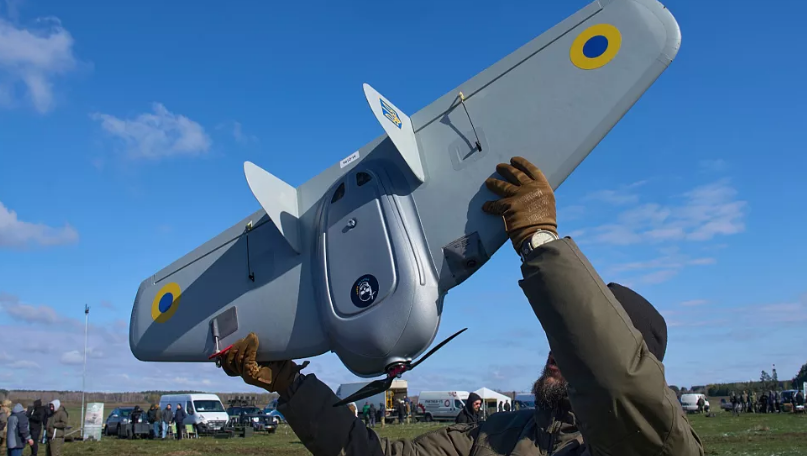
The European Union has launched a new initiative to deepen defence cooperation with Ukraine, drawing on the war-torn country’s battlefield experience to strengthen European capabilities in key areas such as drone production.
The EU-Ukraine Defence Industries Task Force held its inaugural meeting on Monday, aiming to enhance industrial collaboration between Kyiv and Brussels. The effort was announced by European Commissioner for Defence and Space Andrius Kubilius during the second EU-Ukraine Defence Industry Forum.
Kubilius emphasized the urgency of integrating Ukraine’s rapidly evolving defence sector into Europe’s broader security framework, particularly in light of its advancements in unmanned systems and supply chain resilience.
“Today, we announce the creation of the inter-institutional EU-Ukraine Task Force,” he said. “Ukrainian and European experts will now work together to develop joint projects and facilitate procurement processes that strengthen both our defence industries.”
The task force will focus on priority capabilities, especially explosives and drones. According to Kubilius, Ukraine’s innovation in drone production has positioned it as a global leader in the field. “We need to learn from Ukraine how to create a drone production and operation infrastructure,” he said, asserting that Europe stands to gain even more from this integration than Ukraine.
Since Russia’s full-scale invasion in 2022, Ukraine has increased its annual defence production capacity to €35 billion — a 35-fold rise. Kubilius highlighted Ukraine’s ability to deliver modern, cost-effective defence solutions, describing its companies as “fast” and capable of producing at “half the price” of their European counterparts.
Alexander Kamyshin, an advisor to President Volodymyr Zelenskyy, told the forum that the ongoing conflict would be remembered as “the first world drone war.” He noted Ukraine’s success in developing autonomous targeting systems and swarming drone capabilities, technologies he said the country is willing to share with European allies.
“We’re here to build the arsenal of the free world together,” Kamyshin declared.
The EU is set to invest heavily in its defence sector over the next four years, including up to €650 billion in new fiscal allocations and €150 billion through a new loan programme dubbed SAFE. The initiative is designed to support joint procurement and could benefit Ukrainian firms as well.
Talks on the SAFE programme are expected to conclude by the end of May, with disbursements likely to begin by early 2026. Meanwhile, a broader strategic planning effort, including a new Industry Outlook based on member states’ capability targets, is set to be unveiled in June.
“Peace through strength will come from production power and brain power,” Kubilius said. “To stop Putin, we need to produce more, innovate more, and we need to do that together: in the EU and with Ukraine.”
Would you like a version of this tailored for print or online publication?
News
Spy Scandal Strains Hungary-Ukraine Relations as Minority Rights Talks Collapse
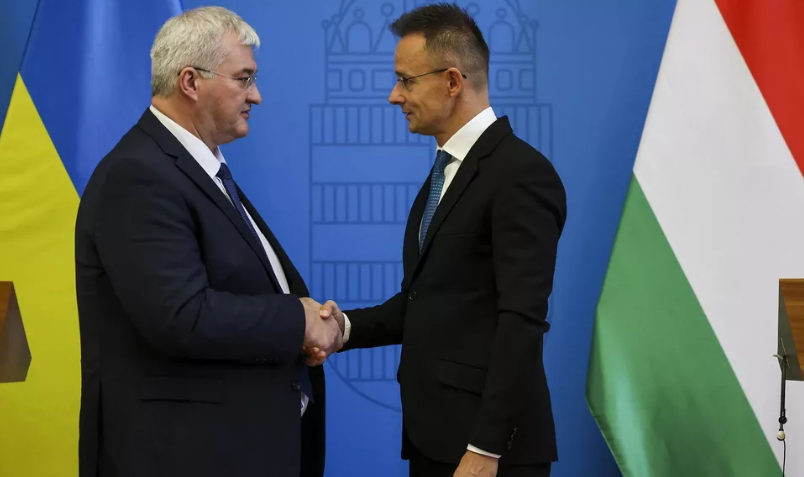
A deepening espionage scandal has plunged Hungary and Ukraine into a new diplomatic rift, with Budapest abruptly suspending planned talks on the rights of ethnic Hungarians in Ukraine’s Transcarpathia region.
According to Ukrainian officials, negotiations that were due to take place on May 12 in Uzhhorod were called off at the last minute by Hungary, despite the Ukrainian delegation already having arrived in the border town. The discussions were meant to address 11 Hungarian recommendations to strengthen the rights of the Hungarian minority living in the southwestern Carpathian region.
The suspension comes amid a growing diplomatic row sparked by Ukrainian allegations of Hungarian espionage. On May 9, Ukraine’s Security Service (SBU) announced that it had uncovered a Hungarian military intelligence network operating on Ukrainian territory. Two former Ukrainian soldiers were detained, accused of collecting sensitive military information for Budapest. The network was reportedly overseen by a Hungarian intelligence officer.
In response, Ukraine expelled two Hungarian diplomats. Hungary retaliated in kind, expelling two Ukrainian officials. Hungarian Foreign Minister Péter Szijjártó dismissed the allegations as “propaganda,” stating that Hungary had not received any formal communication from Kyiv regarding the charges.
Tensions escalated further on Friday when Hungary’s Counter-Terrorism Centre detained a Ukrainian citizen in central Budapest. According to Hungarian authorities, the individual—described as a middle-aged man previously operating under diplomatic cover—was expelled from the country overnight for espionage. The National Directorate General for Aliens determined that his activities posed a “serious threat to Hungary’s sovereignty.”
“The individual was deported after the situation was clarified,” the Hungarian government said in a statement, adding that the suspect no longer had diplomatic immunity.
The deteriorating relations have cast a shadow over longstanding concerns about minority rights in Transcarpathia, where ethnic Hungarians have lived for generations. Hungary has frequently criticized Ukraine for failing to uphold linguistic and cultural rights, while Kyiv has accused Budapest of interfering in its internal affairs.
With both sides now trading expulsions and suspending dialogue, the prospects for resolving the minority rights dispute — or cooling tensions more broadly — appear increasingly uncertain.
The incident marks the latest flashpoint in what has been a historically uneasy relationship between the two neighbours, now further complicated by war, security fears, and mounting geopolitical pressure.
News
Bulgaria to Hold Referendum on Euro Adoption Amid Political and Economic Debate
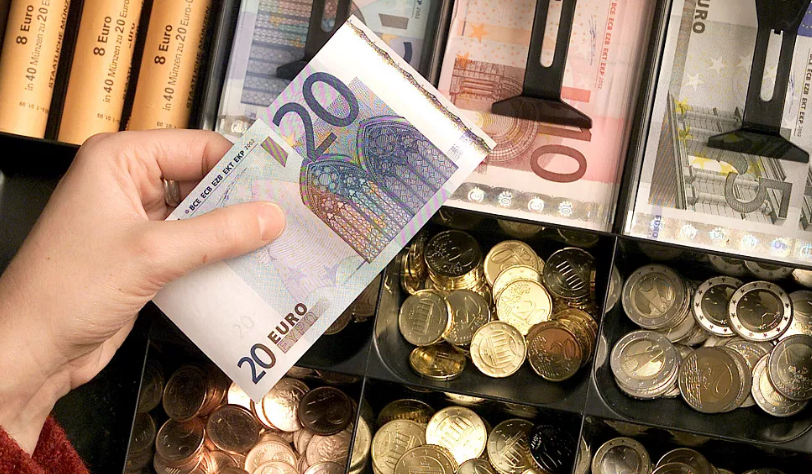
In a move that could reshape the country’s economic future, Bulgarian President Rumen Radev announced he would submit a request to parliament for a referendum on whether the country should adopt the euro as its official currency.
“Bulgaria, as a full member of the European Union, faces a strategic decision — the introduction of the single European currency,” Radev said in a national address. “The referendum will be a test of the National Assembly’s democracy and will show who is following democratic principles and who is denying Bulgarians the right to determine their future.”
The push to adopt the euro comes amid years of political turmoil and economic challenges for Bulgaria, which has been part of the European Union since 2007. The decision to pursue eurozone membership has not been without its hurdles. In 2024, the European Central Bank (ECB) rejected Bulgaria’s bid to join the currency union, citing high inflation as a major obstacle.
In February 2025, the debate reached a boiling point when police in Sofia clashed with nationalist protesters who opposed the government’s plans. About 1,000 demonstrators gathered in front of the European Commission’s Sofia office, throwing red paint and firecrackers at the building, which resulted in a door being set on fire.
While the new government, formed just last month, has made joining the eurozone a priority, not everyone is convinced that Bulgaria is ready for the economic shift. Some economists argue that the country does not yet meet the necessary economic conditions for euro adoption, citing issues such as inflation and fiscal stability.
However, the Bulgarian government, with the backing of pro-European parties in parliament, maintains that adopting the euro is crucial for deeper European integration. As geopolitical tensions rise in Europe, they argue that adopting the euro would help secure Bulgaria’s place within the European project.
At the same time, nationalist factions, particularly those with pro-Russia sympathies, have ramped up opposition to the eurozone bid. These groups are reportedly spreading disinformation in an effort to sway public opinion and create fear around the potential impacts of euro adoption.
As Bulgaria moves toward the referendum, the country finds itself at a crossroads. The decision to adopt the euro will not only affect the economy but could also reshape the nation’s political and diplomatic future within the EU.
The outcome of the referendum remains uncertain, with significant divisions within the country about the advantages and risks of joining the eurozone.
-

 Business12 months ago
Business12 months agoSaudi Arabia’s Model for Sustainable Aviation Practices
-

 Business12 months ago
Business12 months agoRecent Developments in Small Business Taxes
-

 Politics12 months ago
Politics12 months agoWho was Ebrahim Raisi and his status in Iranian Politics?
-

 Business10 months ago
Business10 months agoCarrectly: Revolutionizing Car Care in Chicago
-

 Business11 months ago
Business11 months agoSaudi Arabia: Foreign Direct Investment Rises by 5.6% in Q1
-

 Technology12 months ago
Technology12 months agoComparing Apple Vision Pro and Meta Quest 3
-

 Politics12 months ago
Politics12 months agoIndonesia and Malaysia Call for Israel’s Compliance with ICJ Ruling on Gaza Offensive
-

 Sports9 months ago
Sports9 months agoKeely Hodgkinson Wins Britain’s First Athletics Gold at Paris Olympics in 800m

